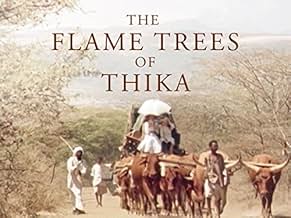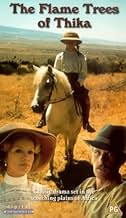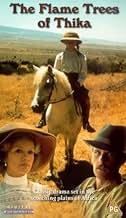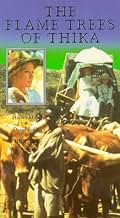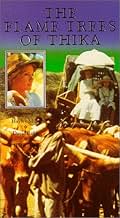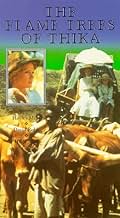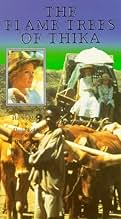CALIFICACIÓN DE IMDb
7.8/10
477
TU CALIFICACIÓN
Agrega una trama en tu idiomaElspeth's family starts a Kenyan coffee plantation. She befriends locals and expats, experiencing nature's beauty and cruelty. An affair between Lettice Palmer and a safari guide runs parall... Leer todoElspeth's family starts a Kenyan coffee plantation. She befriends locals and expats, experiencing nature's beauty and cruelty. An affair between Lettice Palmer and a safari guide runs parallel. World War I changes Elspeth's exciting life.Elspeth's family starts a Kenyan coffee plantation. She befriends locals and expats, experiencing nature's beauty and cruelty. An affair between Lettice Palmer and a safari guide runs parallel. World War I changes Elspeth's exciting life.
- Nominada a3premios BAFTA
- 3 nominaciones en total
Explorar episodios
Opiniones destacadas
10emuir-1
I first saw the Flame Trees of Thika 40 years ago and had forgotten what a superb program it was. I just saw it again on Acorn TV and it is a real feast for the eyes. Made on location in Kenya with actors playing their own nationality, Scots playing Scots, Dutch playing South African Boers, and Kenyan actors and native tribespeople playing the Kenyans, and real wildlife (lots and lots of wildlife) . The location scenery is stunning and amost a travelogue for Kenya. Ben Cross, who passed away last year was in his 30's and ruggedly handsome as a horse trader/safari leader. The acting was top notch. Although set in the early 20th centurywhen Kenya was being colonised by aristocratic second sons and former military officers of the British empire, this is not The Happy Valley of White Mischief - more the second class settlers who are very hard working farmers struggling to establish coffee plantations and farm animals and doing the work themmselves, tatherr than appointing stewards. I plan to buy the DVD to keep on hand for when the series on no longer available on TV.
Unfortunately the first episode on Acorn does not have captions, and has an inferior picture, but I persevered and the subsequent episodes had both captions and a better picture. There is a disclaimer to the effect that certain scenes and lanaguage are counter to what is acceptable today and may offend some people. I don't know what was offensive - colonial rule in East Africa was what it was and we did not see any atrocities or brutalities carried out by the white settlers, nor was there any bad language or graphic sex, so the series could be enjoyed by the whole family.
Unfortunately the first episode on Acorn does not have captions, and has an inferior picture, but I persevered and the subsequent episodes had both captions and a better picture. There is a disclaimer to the effect that certain scenes and lanaguage are counter to what is acceptable today and may offend some people. I don't know what was offensive - colonial rule in East Africa was what it was and we did not see any atrocities or brutalities carried out by the white settlers, nor was there any bad language or graphic sex, so the series could be enjoyed by the whole family.
I recall seeing this movie on PBS in the early 1980's when Masterpiece Theatre presented a rich assortment of British TV shows. In this series, we find the Grant family in colonial Africa before and during World War I. The show is seen through the eyes of daughter Elspeth played superbly by Holly Aird.
It was a pleasant surprise to see Hayley Mills in this series along with David Robb who has been performing on British television for many years. The series gives the viewers some wonderful scenery and a glimpse of life in Africa at the time. It is very telling to hear the comments of young Elspeth on the lives of her parents and the people they interact with in Africa. All in all, a great series with very appealing background scenery.
It was a pleasant surprise to see Hayley Mills in this series along with David Robb who has been performing on British television for many years. The series gives the viewers some wonderful scenery and a glimpse of life in Africa at the time. It is very telling to hear the comments of young Elspeth on the lives of her parents and the people they interact with in Africa. All in all, a great series with very appealing background scenery.
Sometimes you watch a bit of something, and you just KNOW you're seeing something special.
I first saw this series around 20 years ago as a weekly mini-series on PBS. The wonderful story, great acting, beautiful scenery and haunting music has stayed with me. When I saw the video at our local library I was happy to renew my acquainenance with Elspeth and her family in Kenya. The story plays just as well 20 years later.
Thanks to all who had a part in "The Flame Trees of Thika" for giving us such a gift.
I first saw this series around 20 years ago as a weekly mini-series on PBS. The wonderful story, great acting, beautiful scenery and haunting music has stayed with me. When I saw the video at our local library I was happy to renew my acquainenance with Elspeth and her family in Kenya. The story plays just as well 20 years later.
Thanks to all who had a part in "The Flame Trees of Thika" for giving us such a gift.
This is an intriguing curio from British television, based on the autobiographical novel by Elspeth Huxley. The story here sees young Elspeth (Holly Aird) travel out to East Africa with her parents Robin and Tilly Grant (David Robb and Hayley Mills) to set up a new life in the outback during the early 1910's. You sense this is more Robin's idea than a joint venture, but Tilly makes the most of the situation and gradually they build their home there and set up farm land. Soon after they acquire some neighbours, among them game hunter Piet Roos (Morgan Shepherd), Mrs Nimmo (Carol MacCready) and another young couple Hereward and Lettice Palmer (Nicholas Jones and Sharon Maughan), plus the arrival of an enigmatic young stranger in the shape of Ian Crawford (Ben Cross), a Safari guide. But life out in Kenya can be hard and desolate, with many dangers from wild animals, plus the strange customs and beliefs from the natives out there, which makes it all the more fascinating for young Elspeth as she adapts to life there.
I've described Flame Trees as a curio because that is what it is. It was made during a time when TV could just adapt and tell a story involving Brits during the colonization era without being tied up in issues about it's moral aspect. But in fact it gives a fair outlook on both sides of the issue here, with mentions on taking native land and one scene early on when Robin stops Piet Roos from whipping one of his workers to give him "a lesson he needs to learn." But it also doesn't shirk from the natives traditions or superstitions that also dogged their culture, such as one story involving one of the Grants' workers who takes to his bed after another has cursed him for being to blame for the death of his wife and child. As it is autobiographical it tells what it was like out there, not the sanitized version some people may like it to be, and along with the above mentioned it also shows the hardships, the loneliness for some, plus questions the ideas of going out to shoot animals just for "sport", which also leads to one scene where Elspeth admonishes Hereward Palmer for shooting a pregnant antelope, only to later be spanked by her father for refusing to apologize to him.
Elspeth is the main focus on which the story and incidents revolve. She is not always the cause of them, more an observer on life out there, the way the British behave and her fascination with the culture of the natives and her friendship with Njombo (Mick Chege), one of their African workers. Holly Aird is wonderful as Elspeth and carries the plot (such as it is) throughout it's seven episodes. Her innocence and curiosity is what carries this story, learning life lessons along the way, and being a child she is more willing to accept and explore the various native beliefs and superstitions. While some are just that, superstition, others are more spiritual and in one scene she is willing to accept a shaman to bless a baby antelope she has been given to protect it, whereas the adults would of just dismissed it as hocum. And her mother's attempts to be a nurse to the natives inspires her to do much the same with the local wildlife. In one episode she finds an injured pigeon, which she determines to nurse back to health. And the said mentioned antelope, bought as a present for her, often leaves you fearing for it's fate, such are the hazards of Africa. It doesn't sugar coat the reality of Kenya or the struggles to adapt and live out there.
It has to be said that not much actually happens in Flame Trees of Thika. There are incidents, such as Tilly working as a nurse for the natives, a native who believes he has been cursed and the family's attempts to break the native superstition to save him, the murder of a worker, plus the time Elspeth gets left with Mrs Nimmo when her parents go off somewhere and the wild party that occurs. The most prominent storyline involves the arrival of Ian Crawford (a captivating Ben Cross), who falls for the lonely and mentally unstable Lettice Palmer (a very good Sharon Maughan). Ian represents an escape from the loneliness of the outback and the coldness of her husband, who stubbornly refuses to go back. But it only serves to make her more fragile and unstable, not helped when one of her dogs gets killed by a leopard, leading to Hereward determined to track down and kill the leopard to placate his wife. Eventually the outbreak of World War One triggers a motion that breaks up the tranquility of the settlers' existence out there, as the men go off to fight and ultimately tragedy sees the families head back to Blighty. What is left is their experience of a life and culture they knew little about before, and memories of their life out there.
The most remarkable feature of this drama is the presence of Hayley Mills as Tilly Grant. Mills often found the transition from child star to adult career harder due to her breathy almost little girl voice and earnest way of acting, but here you don't notice that it's her. She adapts so well as Elspeth's mother that you just accept her in the role and it's easily one of her best adult performances. She is no shrieking violet when getting stuck into the hard work involved, nor is she scared about going on a hunt and getting close to danger or wild animals. It's a superb performance and deserves a lot of credit for creating a role of a woman just adapting to life out in Africa and all it throws at her. Overall, I found this drama interesting, with Mills in an unexpected role that she totally owns, but it's Holly Aird who is the undoubted star of this, due to being an innocent seeing things with unprejudiced eyes and her embrace of her new homeland. But it's also a strange drama in the fact that not much is actually concluded, and you are left with the feeling of not much actually having happened. It's an interesting curio which proved a big hit in 1981. But as much as I did enjoy it, there is little that lingers long in the memory - except perhaps the shimmering landscape of Kenya and a glimpse into their cultures of the time.
I've described Flame Trees as a curio because that is what it is. It was made during a time when TV could just adapt and tell a story involving Brits during the colonization era without being tied up in issues about it's moral aspect. But in fact it gives a fair outlook on both sides of the issue here, with mentions on taking native land and one scene early on when Robin stops Piet Roos from whipping one of his workers to give him "a lesson he needs to learn." But it also doesn't shirk from the natives traditions or superstitions that also dogged their culture, such as one story involving one of the Grants' workers who takes to his bed after another has cursed him for being to blame for the death of his wife and child. As it is autobiographical it tells what it was like out there, not the sanitized version some people may like it to be, and along with the above mentioned it also shows the hardships, the loneliness for some, plus questions the ideas of going out to shoot animals just for "sport", which also leads to one scene where Elspeth admonishes Hereward Palmer for shooting a pregnant antelope, only to later be spanked by her father for refusing to apologize to him.
Elspeth is the main focus on which the story and incidents revolve. She is not always the cause of them, more an observer on life out there, the way the British behave and her fascination with the culture of the natives and her friendship with Njombo (Mick Chege), one of their African workers. Holly Aird is wonderful as Elspeth and carries the plot (such as it is) throughout it's seven episodes. Her innocence and curiosity is what carries this story, learning life lessons along the way, and being a child she is more willing to accept and explore the various native beliefs and superstitions. While some are just that, superstition, others are more spiritual and in one scene she is willing to accept a shaman to bless a baby antelope she has been given to protect it, whereas the adults would of just dismissed it as hocum. And her mother's attempts to be a nurse to the natives inspires her to do much the same with the local wildlife. In one episode she finds an injured pigeon, which she determines to nurse back to health. And the said mentioned antelope, bought as a present for her, often leaves you fearing for it's fate, such are the hazards of Africa. It doesn't sugar coat the reality of Kenya or the struggles to adapt and live out there.
It has to be said that not much actually happens in Flame Trees of Thika. There are incidents, such as Tilly working as a nurse for the natives, a native who believes he has been cursed and the family's attempts to break the native superstition to save him, the murder of a worker, plus the time Elspeth gets left with Mrs Nimmo when her parents go off somewhere and the wild party that occurs. The most prominent storyline involves the arrival of Ian Crawford (a captivating Ben Cross), who falls for the lonely and mentally unstable Lettice Palmer (a very good Sharon Maughan). Ian represents an escape from the loneliness of the outback and the coldness of her husband, who stubbornly refuses to go back. But it only serves to make her more fragile and unstable, not helped when one of her dogs gets killed by a leopard, leading to Hereward determined to track down and kill the leopard to placate his wife. Eventually the outbreak of World War One triggers a motion that breaks up the tranquility of the settlers' existence out there, as the men go off to fight and ultimately tragedy sees the families head back to Blighty. What is left is their experience of a life and culture they knew little about before, and memories of their life out there.
The most remarkable feature of this drama is the presence of Hayley Mills as Tilly Grant. Mills often found the transition from child star to adult career harder due to her breathy almost little girl voice and earnest way of acting, but here you don't notice that it's her. She adapts so well as Elspeth's mother that you just accept her in the role and it's easily one of her best adult performances. She is no shrieking violet when getting stuck into the hard work involved, nor is she scared about going on a hunt and getting close to danger or wild animals. It's a superb performance and deserves a lot of credit for creating a role of a woman just adapting to life out in Africa and all it throws at her. Overall, I found this drama interesting, with Mills in an unexpected role that she totally owns, but it's Holly Aird who is the undoubted star of this, due to being an innocent seeing things with unprejudiced eyes and her embrace of her new homeland. But it's also a strange drama in the fact that not much is actually concluded, and you are left with the feeling of not much actually having happened. It's an interesting curio which proved a big hit in 1981. But as much as I did enjoy it, there is little that lingers long in the memory - except perhaps the shimmering landscape of Kenya and a glimpse into their cultures of the time.
10ilcooney
Very interesting series. Representative of those times when Africa was under British rule. The British elite & their treatment of the Africans & the brutal hunting of animals in the wild. A well told story.
¿Sabías que…?
- TriviaAlthough billed as a novel, Elspeth Huxley's 1959 book was in fact a semi-autobiographical work, based on her upbringing in the former British East Africa. She corresponds to the Holly Aird character.
Selecciones populares
Inicia sesión para calificar y agrega a la lista de videos para obtener recomendaciones personalizadas
- How many seasons does The Flame Trees of Thika have?Con tecnología de Alexa
Detalles
Contribuir a esta página
Sugiere una edición o agrega el contenido que falta


